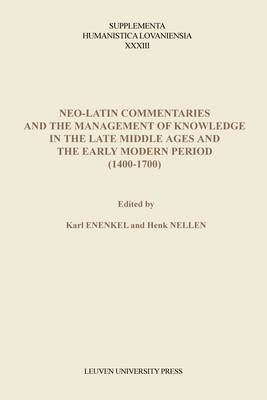
Neo-Latin Commentaries and the Management of Knowledge in the Late Middle Ages and the Early Modern Period (1400–1700)
Leuven University Press (Verlag)
978-90-5867-936-9 (ISBN)
- Lieferbar (Termin unbekannt)
- Versandkostenfrei innerhalb Deutschlands
- Auch auf Rechnung
- Verfügbarkeit in der Filiale vor Ort prüfen
- Artikel merken
Profound study of one of the most important genres within Humanist scholarship
Between 1400 and 1700 the political, religious, intellectual, and even geographic landscape was profoundly changed by the Reformation, Humanism, the rise of empirical science, the invention of printing technology, and the discovery of the New World. The late medieval and early modern intellectuals felt an urgent need to respond to the changes they were involved in, and to come to a revision and re-authorisation of knowledge. They embarked on a scholarly programme of a quality and extent hitherto unknown in the Western world: the whole body of the literature of antiquity, including the Bible, was to be re-edited critically and furnished with commentaries. The Neo-Latin commentary became the most important genre of humanist scholarship. This book sheds light on the various ways in which classical authors and the Bible were commented on, the types of commentary, the commenting strategies that were used to approach different readerships, the various kinds of knowledge that were collected, created, and transmitted, and the usages and reading practices applied to commentaries.
Contributors
K. Enenkel (Westfälische Wilhelms-Universität, Münster), S. de Beer (Leiden University Centre for the Arts in Society), C. Kallendorf (Texas A&M University), C. Pieper (Leiden University Centre for the Arts in Society), M. Pade (Aarhus University), V. Berlincourt (Université de Genève), J. Bloemendal (Huygens Institute for the History of the Netherlands), V. Wels (Berlin), W. J. Zwalve (Institute for the Interdisciplinary Study of the Law, Leiden University), B. H. Stolte (University of Groningen), B. Roling (Institut für Griechische und Lateinische Philologie, Freie Universität Berlin), H. Nellen (Huygens Institute for the History of the Netherlands), J. Touber (Utrecht University)
Karl Enenkel is Professor of Latin Philology of the Middle Ages and the Early Modern Period, Westfälische Wilhelms-Universität (WWU), Münster. Henk Nellen is Research Fellow at the Huygens Institute for the History of the Netherlands and Professor in the History of Ideas in the Early Modern Period at Erasmus University, Rotterdam.
List of Illustrations
Acknowledgements
Introduction
Neo-Latin Commentaries and the Management of Knowledge
1. The Neo-Latin Commentary (1400-1700): A Forgotten and Misunderstood Genre
2. The increased importance of the commentary and other paratexts in the early modern period
3. The commentary as an open genre. The early modern commentary’s tendency toward emancipation from the source text
4. The kaleidoscopic functions of the early modern commentary
a. The commentary as a means of authorization
b. The commentary as an educational tool at schools and universities
c. Early modern commentaries as encyclopedias of learning
d. Commentaries and textual criticism
e. Commentaries and the cultural history of antiquity (ars antiquitatis)
f. Political commentary
g. Commentaries as stimuli for social cohesion and as polemical platforms
h. Parafrasis as literary exercise
i. Manuscript annotations in printed books
5. The layout of the early modern commentary
6. Indexing
7. Related genres: variae lectiones, dictionarium (dictionary) and encyclopedia
8. The commentary in historical perspective
9. The present volume
96085_Enenkel&Nellen_vw.indd 5 10/06/13 13:10
I. Historical and geographical collections of knowledge
Karl Enenkel (Westfälische Wilhelms-Universität, Münster)
Kommentare als multivalente Wissenssammlungen: Das ‘Fürstenspiegel’-Kommentarwerk Antonio Beccadellis (De dictis et factis Alphonsi Regis Aragonum, 1455), Enea Silvio Piccolominis (1456) und Jakob Spiegels (1537)
Susanna de Beer (Leiden University)
The World Upside Down: The Geographical Revolution in Humanist Commentaries on Pliny’s Natural History and Mela’s De situ orbis (1450-1700)
II. Classical Poetry
Craig Kallendorf (Texas A&M University, College Station)
Virgil and the Ethical Commentary: Philosophy, Commonplaces, and the Structure of Renaissance Knowledge
Christoph Pieper (Leiden University)
Horatius praeceptor eloquentiae. The Ars Poetica in Cristoforo Landino’s Commentary
Marianne Pade (Aarhus University)
Niccolò Perotti’s Cornu copiae: The Commentary as a Repository of Knowledge
Valéry Berlincourt (Université de Genève)
‘Going beyond the Author’: Caspar von Barth’s Observations on the Art of Commentary-Writing and his Use of Exegetical
Digressions
III. Drama
Jan Bloemendal (Huygens Institute for the History of the Netherlands, The Hague)
In the Shadow of Donatus: Observations on Terence and Some of his Early Modern Commentators
Volkhard Wels (Berlin)
Contempt for Commentators: Transformation of the Commentary Tradition in Daniel Heinsius’ Constitutio tragoediae
IV. Law
Willem J. Zwalve (Leiden University)
Text & Commentary: The Legal Middle Ages and the Roman Law Tradition: Justinian’s Const. Omnem and its Medieval
Commentators
Bernard H. Stolte (University of Groningen)
Text and Commentary: Legal Humanism
V. Bible
Bernd Roling (Freie Universität Berlin)
Animalische Sprache und Intelligenz im Schriftkommentar: Bileams Esel in der Bibelkommentierung des Mittelalters und der Neuzeit
Henk Nellen (Huygens Institute for the History of the Netherlands, The Hague)
Bible Commentaries as a Platform for Polemical Debate: Abraham Calovius versus Hugo Grotius
Jetze Touber (Utrecht University)
Philology and Theology: Commenting the Old Testament in the Dutch Republic, 1650-1700
Notes on the Contributors
Index
| Erscheint lt. Verlag | 15.7.2013 |
|---|---|
| Reihe/Serie | Supplementa Humanistica Lovaniensia |
| Verlagsort | Leuven |
| Sprache | englisch |
| Maße | 160 x 239 mm |
| Gewicht | 57 g |
| Themenwelt | Literatur ► Klassiker / Moderne Klassiker |
| Geschichte ► Teilgebiete der Geschichte ► Kulturgeschichte | |
| ISBN-10 | 90-5867-936-5 / 9058679365 |
| ISBN-13 | 978-90-5867-936-9 / 9789058679369 |
| Zustand | Neuware |
| Haben Sie eine Frage zum Produkt? |
aus dem Bereich


